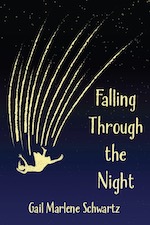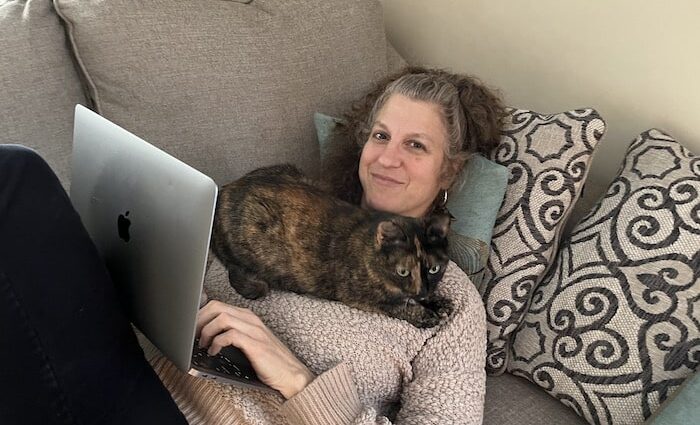by Gail Marlene Schwartz
As a six-year-old, my parents forced me to see a therapist, Dr. Solky. I hated it and I hated him. When Dr. Solky would peek his head into the waiting room to call my name, my mother would literally drag me into his office kicking and screaming.
The room was set up for kids, and the doctor kept a large easel in the corner. The first thing I always did was to take that easel and plunk it down between his chair and mine (so I didn’t have to look at his ugly face, thought I).
But an interesting thing happened after a few sessions. There was a small pad of paper and markers next to my seat, and one day, when he asked me that unbelievably irritating question yet again, “How are you feeling?” I grabbed a marker and wrote “Mad!” and slid the pad underneath the easel.
We communicated like that for a few weeks, passing notes back and forth, and it eventually led into a lovely connection that was foundational to my development.
Sharing Our Mess Helps Everyone Heal
Falling Through the Night was originally a collection of personal essays about queer motherhood. Writing has, since the Dr. Solky days, been one of the main ways I’ve documented, explored, and communicated my experiences.
Becoming a mom at age 43 with my female partner was both thrilling, because having a healthy family had always felt like an impossible dream, and also terrifying, because the model I had growing up was not what I wanted to repeat; I really didn’t know what I was doing. So I wrote about it.
Writing to connect is for me both activism and personal healing, both a big part of my artistic impulse. I knew there were others like me who wanted to raise their children differently, better, who had rough experiences growing up, and I wanted to share my messy stories.
We’re all better when we can talk about the stuff nobody talks about; we don’t feel so crazy, and we can help each other. I knew from past experiences that books about struggles can help make readers feel less alone and more optimistic, and maybe even be part of their healing.
How Writing About Difficult Experiences Helped Me
The first essay I wrote that ended up being part of the book was about giving up one of my babies. Our children were fraternal twins, and early on, we found out that one had Down Syndrome. My ex and best friend, Lucie, and I made the difficult decision not to terminate but to move forward with both births and to put Baby B up for adoption because we didn’t feel capable of parenting him.
It was a very complex experience, one people around us had many different reactions to, and it was also a beautiful experience to have lived through, ultimately, though also a very painful one. I was thrilled to get an Honorable Mention for this piece, “Loving Benjamin,” in Room Magazine, a prominent feminist journal in Canada where I was living at the time, and that was exciting as it was the first piece I’d ever submitted for publication. I wrote more essays about my motherhood adventures, and several of those were published too.
So I felt very encouraged as a writer. When I had about twelve of these essays, I sensed that they would make a good book, and I was ready to write my first book when I made the decision to create it.
Writing Translates My Untranslatable
I was the kid who acted out and was in trouble constantly at home, but interestingly it never happened at school. I found out much later, as an adult, that my mother suffers from a personality disorder, OCD, and probably autism. I’m an anxiety sufferer with mild OCD and likely high-functioning autism (my son was officially diagnosed last fall, and we’re very similar).
I’m guessing I was born with an autistic brain, but that I picked up the anxiety from childhood. I was both terrified of my mother and also angry at the way I was targeted and blamed. She just didn’t have the capacity to parent my sister and me. My father had massive childhood trauma stemming from losing his mother when he was seven. They were so young, early 20s, and they had little support.
There was also very little understanding of mental health and neurodivergence. I don’t think they stood a chance with their family, even though they tried. I feel sad thinking about how hard it must have been for them.

Keeping a Journal Helped Me Figure Myself Out
I was actually lucky in that although I was the designated problem child, at least I got support. I’ve been seeing a therapist on and off since age six, 50 years ago, and I’ve had some really great role models in my counselors.
But writing has been helpful in a very different and equally important way. I kept a journal throughout most of my childhood, adolescence, and early adulthood, and this gave me a very concrete process for figuring myself out.
When I’m in an anxious or heightened emotional state, it’s very difficult for me to think clearly. I know something bad is happening and that I’m in danger, but I don’t know much else. Writing requires engaging the other side of the brain, so it’s like translating an experience for myself.
Even when I couldn’t write anything very coherent as a kid and teenager, I’d pen the f-word over and over, and even that was helpful. It was cathartic, and the paper always received my self-expression with quiet grace. And the act of gripping a writing implement and putting down a word, even a swear word, helped me gradually shift over to my logic center and begin piecing together what was happening, helping me regain my center.
I struggle so much less than I used to. I take medication, but therapy, writing, and chosen family are the heart of my healing practice. When I experience PTSD, although rare, I still rely on writing to help find my way out or at least through.
The Surprising Challenge of Making Real People Fictional
Character is generally something that comes easily for me, but because some of the characters in Falling Through the Night were based on real people, a big challenge was taking the experiences in the essays and reshaping the personalities of the characters involved. Jessica and Martha, who are completely fictional, are my favorites, and I don’t think that’s an accident.
I also found the plot very challenging because this book was totally and completely “pantsed.” I had to take the elements in the essays and fold them into an overarching plot in which everything made sense. The book I’m working on now began in a much more organized way, and I’m definitely finding it easier, although I don’t regret the process for Falling. I wouldn’t have had the courage to write a novel otherwise.
I Pushed Past Isolation and Rejection
Something I always struggle with in writing is the solitary nature of it. I’m an introverted extrovert, someone who needs alone time but is ultimately energized by collaboration. The amount of hours I had to spend by myself writing and revising was just draining. Not having anybody to bounce ideas off on a regular basis was not ideal for my creativity, either.
The other three books I’ve published were co-written with Lucie, and the book that’s launching in 2025 through Motina Books, Boyhood Reimagined: Stories of Queer Moms Raising Sons, is a collection of essays I’m co-editing with my good friend, Jenn Marlow. Writing a short story alone is perfect in terms of amount of alone time, especially when I have accountability and critique partners, but a book was tough.
The other piece that was hard was maintaining faith in the book in spite of several years of rejection before Demeter Press accepted it. I’m an insecure person, and it was difficult to remember that a rejection doesn’t mean the book isn’t any good.
I had J.K. Rowling’s experience scribbled on a sticky note on my desk while querying; apparently she submitted Harry Potter 12 times before Bloomsbury accepted it. There were a bunch of times I thought about stopping the querying process, but something kept driving me forward. I really wanted the novel to be born.
My Book Baby Took a Village
I’m incredibly grateful because I actually had a lot of help with Falling Through the Night. The first thing I did that had a huge impact was hiring Canadian author Betsy Warland as a manuscript consultant. I had read Betsy’s writing book, Breathing the Page, and some of her creative work and respected her tremendously.
I remember when we met, and in the midst of a complicated conversation about the essays, she looked up at me suddenly and asked, “Do you think this material wants to be a novel?” I was instantly thrilled and terrified, much like I felt when I found out I was pregnant. It was the exact right thing, but I had always said I didn’t have it in me to write a novel. Ultimately, I was wrong, and she was right.
Then, fast forward a few years, when I had a manuscript drafted, I took a novel-writing class in Montreal through the Quebec Writers’ Association. My teacher was Claire Holden Rothman, and she was fantastic. Claire and my classmates gave feedback on the prologue (which ultimately was cut) and the first three chapters. We also had a lot of conversations about issues like structure, conflict, sex scenes, portraying characters of different identities, and other issues I had never discussed explicitly with critique groups or writer friends.
I revised for another few years at which point I found a beta reader, my friend Talia Weisz, also a writer herself and a brilliant one. She offered me very different feedback than I had gotten from the class, and that information gave me what I needed for final edits before I began submitting.
In addition to direct help, I also had encouragement from my fellow writers at Inked Voices, my online writing community, as well as my family. Lucie did the proofreading for the French, because there’s a lot of it in the book. My partner Erin designed the cover and was there when I got the acceptance from Demeter. And my son, Alexi, who is 13 and grew up with the book, was super sweet and generally supportive. All of that mattered.
A Deeper Understanding of Human Nature and How to Live My Values More Fully
Connection heals. It really does. The book brought me into connection not only with my experience, but with the experiences of my characters, and this had a profoundly positive effect on me.
One of my favorite authors, Siri Hustvedt, wrote an essay, “Three Emotional Stories: Reflections on Memory, the Imagination, Narrative, and the Self,” in which she defends fiction in an era that glorifies truth telling. She did some research that found the part of the brain that processes memories is the same part in use when we’re creating or imagining.
She says, “Writing fiction is like remembering what never happened.” So the scenes from my book live like memories in my brain, which has meant coming to peace.
For example, Lucie and I had a heartbreaking experience in which a close friend of ours died of terminal cancer, and she didn’t want us to be close to her during the time she was ill. We never found out why, and of course we respected it, but it was very sad.
In the book, I had Audrey learn the reason why her friend made that choice in a similar situation. It took writing that part of the story for me to feel settled and at peace with my experience with my friend who passed. I didn’t consciously choose to write that scene to heal myself, but that’s what happened; it definitely shifted me into a softer, more nuanced, and more loving place.
Writing Has Helped Me Become Less Judgmental of Others
My characters in other later work became a lot more complex as a result of writing Falling, too, and I think this has meant being less judgmental toward real people. I’ve hurt people and have been hurt, and I know that in general, nobody means to cause pain. So much of what happens is based in miscommunication or suffering.
I recently went through something difficult at work, and although my PTSD was activated and it was hard, I was also able to be in that situation with a lot more complexity than I might have years ago, and I think writing Falling Through the Night had a lot to do with that flexibility.
And then there’s the externals. I made the huge decision to hire a publicist (big shout out to Layne Mandros and the Books Forward team!). It was more money than I’ve spent on anything other than a vehicle or a home and one of my best decisions. It felt like a way to honor my fiction writing, which has nothing to do with anything practical like caring for my son or making money.
Slowly, I’m learning how to prioritize what’s important to me: art, community, relationships. My partner and I sold our house and are choosing to rent because we don’t want to take care of a building. That was never something I would do even five years ago because it’s not considered practical or fiscally intelligent. I just feel a much larger sense of confidence and honoring of myself as a “real artist,” and some of that is about this experience with my novel.
Advice for Writers
Find a writing community (Inked Voices is fabulous, but there are so many to choose from). Find other people writing novels in the same genre as yours, and offer to be beta readers for one another.
If you’re querying, be persistent. Have fans of your work remind you that it’s good and worthy and important. Read about successful writers you admire and how long it took them to get their first book published.
Tend to your whole self. I started a literary magazine, Hotch Potch Literature and Art, with some friends during the process because I wanted and needed to be creating with other people. If I don’t get out into nature and in my body, I am a far less effective writer.
When I go to writing retreats, I spend time doing visual art and running, so I can be in the physical world. Otherwise, I feel like a disembodied head and fingers. Strive for balance. And for God’s sake, don’t feel like you have to write every day or follow any other rules. That’s horse manure. Follow your own program. Nobody can decide what’s best for you better than you.
* * *
Gail Marlene Schwartz is a dual citizen, a relationship artist, and an above-average pianist. She is co-author of the books My Sister’s Girlfriend and The Loudest Bark (Rebel Mountain Press) and co-editor of the forthcoming essay collection, Boyhood Reimagined: Stories of Queer Moms Raising Sons (Motina Books).
She is a founding editor of Hotch Potch Literature and Art, a collaborative online magazine, and also a freelance editor, writing coach, and writing instructor at the Community College of Vermont. Gail lives in Montpelier, Vermont with her partner, Erin; she spends every other weekend in Montreal with her best friend, Lucie, and their teenage son, Alexi. You can read more about her at gailmarleneschwartz.com.
Follow Gail Marlene Schwartz on social media:
Twitter: @GSchwartzauthor | Instagram: @gailmarleneschwartzauthor
 Falling Through the Night: Audrey Meyerwitz, an introverted 30-something adoptee with anxiety, wants nothing more than to fall in love and create a healthy family, but the path to romance isn’t simple. Audrey’s life has been packed with sleepless nights, psychiatrists, and a string of nightmare ex-girlfriends. Determined to ensure that her future is a step in a healthier direction, Audrey lets her best friend Jessica, a recovering alcoholic, sign her up for a queer online dating app. What ensues is Audrey’s scary first step toward her lifelong dream: a strong, loving family.
Falling Through the Night: Audrey Meyerwitz, an introverted 30-something adoptee with anxiety, wants nothing more than to fall in love and create a healthy family, but the path to romance isn’t simple. Audrey’s life has been packed with sleepless nights, psychiatrists, and a string of nightmare ex-girlfriends. Determined to ensure that her future is a step in a healthier direction, Audrey lets her best friend Jessica, a recovering alcoholic, sign her up for a queer online dating app. What ensues is Audrey’s scary first step toward her lifelong dream: a strong, loving family.
When Audrey falls for Denise, a French Canadian from Montreal, she finds herself immigrating to Canada and building a new life in Quebec, where she finds community in a collection of queer friends and, eventually, embarks on her dream of starting a family. But when she unearths a secret about her adoptive mother, she must re-evaluate everything she understood about her place in the world.
Funny, honest, and profound, “Falling Through the Night” is a stirring story about cultivating healthy love from profound alienation: accepting both gains and losses, taking off the blinders of fantasy, and embracing the messiness that defines human nature and imperfect families.
Available at Demeter Press, Amazon, Barnes & Noble, and wherever books are sold.

